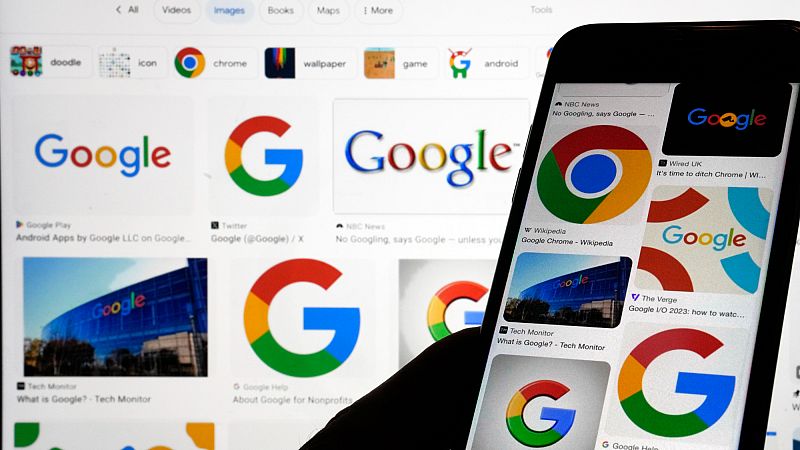AI companies want to browse the web for you. We tested 2 to see how well they actually work

Two Big Tech companies launched artificial intelligence-powered (AI) search bars this week in a bid to shake up how users find information on the web.
Google AI Mode launched in the United Kingdom after previously rolling out in the United States and India. It combines the platform’s Gemini 2.5 AI model with search to let users ask exploratory questions with voice, pictures and text. The company says it can also compare products, plan a trip, and understand complex how-to questions.
Microsoft also launched Copilot Mode in the Bing search bar. It says its Copilot AI model “reads, compiles and reasons about information available on the web,” and then presents it in a concise answer.
But what do these search bars actually do and what is different from traditional search engines Microsoft Bing or Google Search?
The Euronews Next team put the AI search services’ capabilities to the test, using queries that people might be tempted to try.
Works similarly to conversations with AI chatbots
We asked it for recommendations on an e-bike, to provide a seven-day meal plan with diet constraints, aggregate job postings for AI engineers in London, and to present all viewpoints on how well measles vaccines work.
So far, both search engines work like a chatbot. Faced with our queries, they launched into conversation and gave recommendations for e-bikes or jobs they thought we should apply for.
Both Google AI and Copilot also make many assumptions about what their user is looking for that it uses to tailor its recommendations.
For example, both search bars assumed in the meal plan prompt that we had cooking experience, that we exercised regularly, and that we had no other dietary restrictions.
Tabs influence suggestions on Copilot
If we enabled “context clues” in Microsoft’s Copilot AI, the model changed its answers to our queries based on the tabs that we had open.
In one experiment, we asked Copilot to recommend jobs as an AI engineer in London. Without any extra tabs open, it gave us links to BeBee, a job aggregation platform. With tabs like Glassdoor, LinkedIn, Indeed, and UK job site Reed open, it suggested only roles posted on these platforms.
Asked to explain itself, Copilot said it included these roles because they are “likely to reflect what you’re actively exploring”.
Google AI Mode doesn’t use “context clues”.
Copilot, Google AI Mode highlight potential misinformation
We tested the platforms on a more controversial topic, asking Copilot and Google AI Mode to summarise all viewpoints on the measles vaccine. We chose the issue because it has been subject to years of misinformation from many sources online.
We ran two searches on Copilot: one with no tabs open and one with a handful of websites open that are known for spreading medical misinformation.
In both answers, Copilot started by saying that the measles vaccine was highly effective, while acknowledging that rare side effects can happen. The search engines included answers that they described as “alternative” or “fringe” perspectives such as questions about how long the vaccine gives immunity.
When asked for its sources, Copilot said it relied on “high-quality sources” from the World Health Organization, the US Centers for Disease Control and Prevention (CDC), and peer-reviewed articles from medical journals.
The search engine said it picked these sources because they are peer-reviewed, collected global data, and published their methodologies – and said it “didn’t cherry-pick studies”.
With the misinformation tabs open, however, Copilot provided similar answers but included more information about the “sceptical” or “alternative” viewpoints.
It said it assumed that we wanted to see these perspectives and that they should be “contextualised … carefully to avoid amplifying misinformation.”
Google AI had a similar approach. It started with the scientific consensus – arguing that if it didn’t, “ignoring this would be misleading and potentially harmful”.
Its summary did include some perspectives that could be considered sceptical of routine vaccines, but it introduced them with a disclaimer: “It's essential to include this viewpoint because it represents a significant part of the public discourse, even if it contradicts the scientific consensus”.
Euronews Next contacted Microsoft and Google for information on how their models determine what is a “high-quality source,” but did not receive an immediate reply.
No task-handling yet
The models so far appear to be sophisticated search engines rather than personal assistants. Asked to create a meal plan and add groceries to a shopping cart, Google AI fell short.
Meanwhile, when Microsoft released its model, it included a video that shows Copilot Search recommending a paddle board company based on a user’s inquiry – and making a reservation for that rental.
But when we asked Copilot to make a dinner reservation, a doctor’s appointment, or to upload a resume to a job portal, Copilot said it would “be thrilled” to help but that it doesn’t have the abilities that we are looking for.
The company says future updates for Copilot Search will allow users to ask the search bar to do these kinds of tasks.
Today

